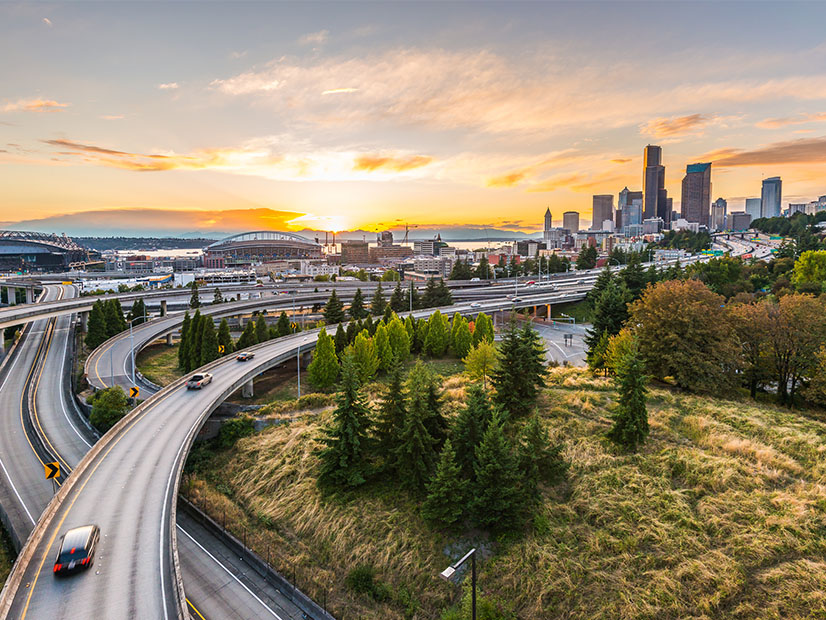
Washington lawmakers are considering a bill to apply a per-mile charge to electric vehicles to compensate for expected lost gas tax revenue over the next few decades.
The bill (HB 2026) introduced by Rep. Shelley Kloba (D) calls for EVs to pay the state a “road usage charge” of 2.5 cents per mile starting in July 2025. That fee would be mandatory for EVs bought as of that date and voluntary for EVs purchased prior to that date. The mandatory annual fee would be capped at $225, while the voluntary fee would be limited to $175.
The bill would allow certain hybrid vehicles to participate in the road usage charge on a voluntary basis beginning July 1, 2026. The Washington State Department of Licensing and a joint subcommittee of the House and Senate transportation committees would be charged with evaluating the program and recommending improvements to the main House and Senate transportation committees by Jan. 1, 2029.
The money raised by the charges would go to various Washington transportation funds.
The Licensing Department would be required to offer EV owners one or more methods of reporting miles driven, including one based on submittal of periodic odometer mileage. The department also must offer one or more automated reporting methods. The state could use private sector services to manage the process.
At a Thursday hearing before the House Transportation Committee, Travis Dunn, vice president of consulting firm CDM Smith, said Washington’s gas tax revenues are expected to shrink by half by in the next two decades, assuming that 27% of the state’s vehicles will be EVs by 2040.
“Another factor is that cars will become more fuel-efficient and require less refueling,” said Reema Griffith, executive director of the Washington State Transportation Commission.
“HB 2026 gets us on a path to steady transportation revenue,” Rep. Emily Wicks (D) said. “The gas tax is a fleeting revenue source,” testified Jane Wall, executive director of Washington’s County Road Administration Board.
Inslee Wary of EV Fee
However, Gov. Jay Inslee opposes the bill in its current form, said Debbie Driver, Inslee’s senior transportation adviser. One objection was making the EV per-mile charge mandatory in 2025. “It could dissuade people from buying an EV,” she said.
Driver could not predict whether Inslee would veto all or part of the bill, if passed.
In a follow-up e-mail, Inslee spokesperson Mike Faulk wrote: “Our office’s concerns are there are still key untested elements to this policy, including the impact a mandatory [road usage charge] might have on a consumer’s choice to purchase a new EV, privacy concerns and impacts to low-income drivers with longer commutes.”
Faulk wrote that Inslee does not oppose road usage charges but wants more due diligence on the matter — especially on the effects of gas taxes and EV fees on the poor. If low-income families end up paying EV charges, the governor wants those charges to be less than what such families pay in gas taxes, Faulk said.
Faulk also noted that Inslee’s fiscal 2022/23 budget proposal asked for $100 million in rebates to make EVs accessible to low- and moderate-income Washingtonians. The proposed rebates are $7,500 for new EVs and $5,000 for used vehicles. Inslee has proposed an additional $5,000 rebate for people making less than 60% of the state’s median income.
At the hearing, EV interests and some EV owners supported the proposed charge. “It’s a more equitable approach for EV drivers to pay their share,” Peter Chipman, policy director for Plug In America, said.
Meanwhile, a half dozen private citizens testified against the bill, arguing that it would represent an extra unneeded tax.
“It’s too early to make such a systematic drastic change,” private citizen Eric Pratt said. “This assumes everyone will jump on the electric vehicle wagon,” Jeff Pack of Washington Citizens Against Unfair Taxes said.
Kloba said the proposed EV charge replaces tax revenue and does not add to drivers’ tax burdens.


